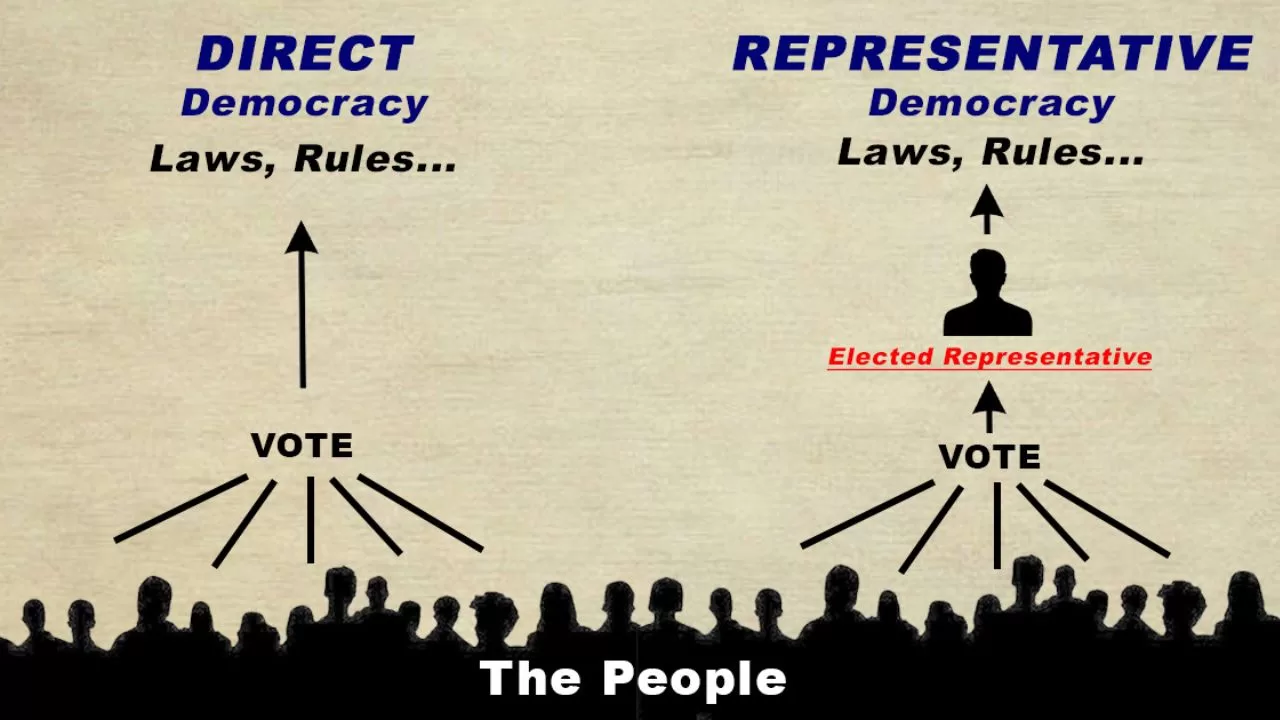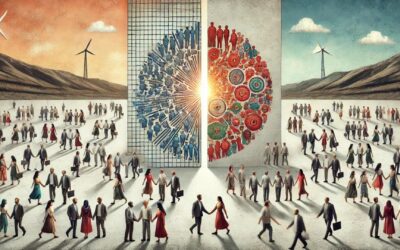In the heart of a bustling European city, two friends, Elara and Marco, found themselves sitting in a quaint café overlooking the city square. As the sun cast a golden hue over the cobblestone streets, the two friends sipped their cappuccinos and began a discussion about the city’s upcoming referendum—a matter of direct democracy that had the town abuzz.
“Isn’t it empowering?” Elara began, “The very idea that each one of us gets a say on this matter! That’s the beauty of direct democracy.”
Marco leaned back, thinking deeply, “Yes, but think about it, Elara. While direct democracy lets every citizen have a direct vote, is it always practical? Imagine if we had to vote on every issue.”
Their conversation embodied a larger debate: Direct vs. Representative Democracy. Let’s delve deeper into their discussion to understand both systems’ strengths and challenges.
Direct Democracy: Power to the People
Elara, an ardent supporter of direct democracy, believed that this approach ensured the truest form of people’s will. In a direct democracy, citizens vote on policies directly, without representatives acting on their behalf.
Advantages:
- True Representation: Citizens express their opinions directly, leading to policies that more accurately reflect the people’s will.
- Increased Political Participation: Being directly involved can make citizens feel more connected and responsible for the political decisions.
- Reduction in Corruption: Without representatives as intermediaries, there’s less room for corruption and personal agendas.
Challenges:
- Feasibility: In large nations, it’s logistically challenging to gather opinions on every policy matter.
- Overwhelm and Lack of Expertise: The average citizen may not have the knowledge or expertise to make informed decisions on every issue.
- Mob Rule: Majority decisions might suppress minority rights.
Representative Democracy: Delegating Responsibility
Marco, having studied political systems extensively, leaned more towards representative democracy. Here, citizens elect representatives who then make decisions on their behalf. Most modern democracies, including their own, operated predominantly under this system.
Advantages:
- Practicality: It’s feasible for large nations where direct voting on every issue would be impractical.
- Expertise: Elected representatives, ideally, should have the expertise or at least the resources to research and make informed decisions.
- Balanced Views: A good representative considers the views of their entire constituency, ensuring minority voices are heard.
Challenges:
- Misrepresentation: If representatives don’t act in the best interests of their constituents, the essence of democracy could be lost.
- Potential for Corruption: Representatives might act in their interest or under external influence, diverting from the people’s will.
- Complacency Among Citizens: With no direct role, citizens might become politically disengaged.
Back at the café, Elara pondered, “But Marco, doesn’t direct democracy ensure that the government always mirrors what the people want?”
Marco replied, “In theory, yes. But consider larger nations. It’s not feasible to have everyone vote on everything. And while our referendum here might be simple, issues of national security, economic policy, or international relations aren’t always black and white.”
Elara nodded, “True. But with representative democracy, aren’t we just hoping our chosen leaders act in our best interest?”
“To some extent,” Marco conceded. “But that’s why it’s essential for us, the citizens, to stay informed, engage in discourse, and hold our representatives accountable.”
Their conversation underscored the reality that no system is perfect. Both direct and representative democracies have their merits and challenges. The key is to find a balance, possibly incorporating elements of both systems, ensuring that while the people’s will is paramount, decisions are made effectively and efficiently.
As the sun set, painting the sky in shades of purple and gold, Elara and Marco left the café with a renewed understanding. They realized that regardless of the system in place, active participation, constant vigilance, and open dialogue remain vital for a thriving democracy.
And so, as we reflect upon their discourse, we must remember that while systems and structures matter, it’s our role as citizens that truly defines the essence of democracy. Whether direct or representative, the power ultimately lies with the people. The question is, how do we choose to wield it?
Keywords
- Referendum: A general vote by the electorate on a single political question which has been referred to them for a direct decision.
- Direct Democracy: A form of democracy in which people decide on policies directly.
- Representative Democracy: A type of democracy founded on the principle of elected officials representing a group of people.
- Feasibility: The practicality or possibility of something being accomplished or realized.
- Overwhelm: To overpower or inundate, especially with things or people to be dealt with.
- Expertise: Special skills or knowledge in a particular field.
- Mob Rule: Control by a violent and aggressive crowd, rather than by laws.
- Misrepresentation: The act of giving a false or misleading representation of the nature of something.
- Complacency: A feeling of contentment or self-satisfaction, often combined with a lack of awareness of potential dangers or problems.
- Discourse: Written or spoken communication or debate.
Key Takeaways
- Direct democracy allows citizens to vote on policies directly without intermediaries.
- While empowering, direct democracy might not always be practical, especially in larger nations.
- Representative democracy has citizens elect representatives to make decisions on their behalf.
- While representative democracy is more feasible for larger countries, there is potential for misrepresentation and corruption.
- Regardless of the system, active citizen participation is crucial for a thriving democracy.
- A balance might be found by incorporating elements from both systems.
- Vigilance and open dialogue are essential to ensure the success of any democratic system.
Articles on The Story of Democracy
Journey Through Democracy: Origins, Evolution, and The Path Forward (Featured Article)
Direct vs. Representative Democracy: Which Truly Reflects the People’s Will?
Democracy 2.0: How Technology is Reshaping Civic Participation
The Pulse of Democracy: Minorities Seeking Equal Rights and Representation
The Fragile Nature of Democracies: When Governance Takes a Dark Turn
The Power of Civic Learning: Shaping Democracy’s Future
Wealth & Freedom: How Economic Systems Shape Democracies












0 Comments